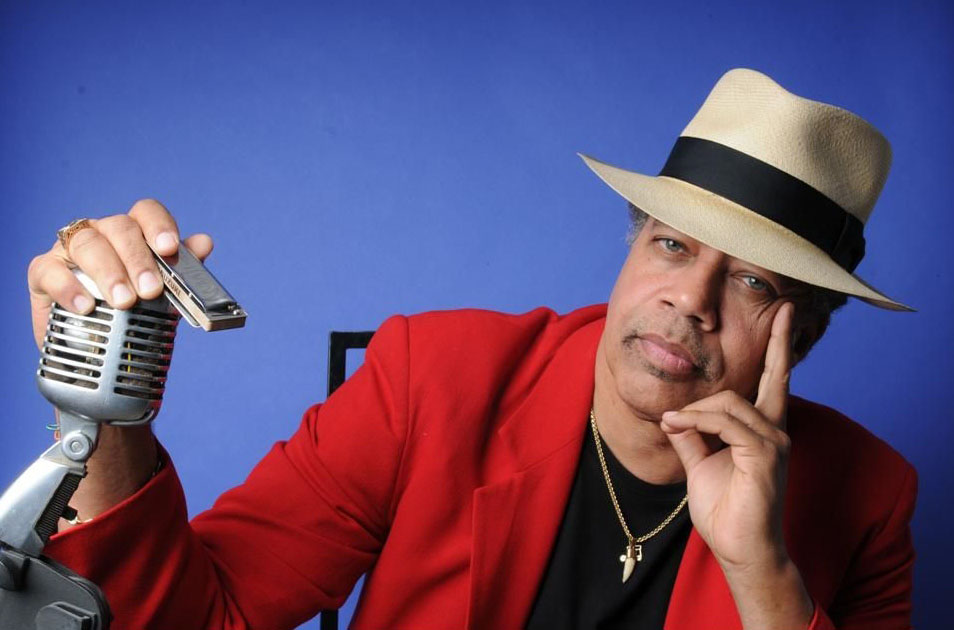Are you all a bougie Hyde Park jazz crowd or are you a blues crowd?” So shouted Billy Branch’s bass player Marvin Little into his microphone, urging the audience at the Promontory to shout back. Shout back they did, although half-heartedly, in affirmation of the storied tradition of grungy Chicago blues. As Billy Branch and the Sons of Blues took the stage on the night of April 11, a rowdy evening of blues began. However, with an audience whose average age was above fifty and who was mostly seated at reserved private tables, Branch’s extreme energy seemed like a precious relic of a bygone era.
Branch’s performance began with his band, the Sons of Blues, jamming without their front man for a few minutes in anticipation of the blues legend’s emergence onto the stage. The hype seemed enormous—first each member of the band took turns soloing, with Little’s heavy, deep, bass lines resonating throughout the dimly lit auditorium. Little has taken the place of longtime Sons of Blues bassist Nick Charles, who passed away of cancer last year. After some funky slapping on the bassist’s part, Little introduced a friend of Billy Branch’s; he, in turn, introduced the bluesman himself, who danced onto the stage with harmonica in hand. Dressed in a gray blazer and a wide-brimmed hat, Branch dominated the stage from the moment he stepped onto it, reaching wild tones on his harmonica.
Billy Branch is one of the last remaining musicians of Chicago’s second generation of bluesmen, who came of age in the 1960s. Chicago blues itself was initially created in the early twentieth century by legends such as Howlin’ Wolf and Muddy Waters.
“I’ve been playing professionally for about forty years, and I picked up the harmonica as a child before I discovered the blues,” says Branch. In those forty years, Branch has dabbled in all sides of the music industry, from solo playing and recording to music education. His Blues in Schools program, which he has personally run since 1978, has taken him across the world from Belgium to Mexico, teaching kids and performing the blues in various schools. Branch has not taught on the South Side of Chicago, but he has performed here numerous times
Branch is a self-educated musician, and his fifty-plus years of experience with the harmonica was on display at the Promontory show, where his instrument squealed, sang, honked, and growled in perfect harmony with his backing musicians. He says he was inspired to take up blues as an art form after witnessing the precursor to the Chicago Blues Festival in the summer of 1969 and hanging out in blues clubs throughout the early seventies, all while attending the University of Illinois at Chicago. It was there that he met his mentor, the blues legend Willie Dixon. “He taught me a lot, he told me about the importance of the blues and how important it was to American culture and African-American culture,” recounts Branch. “Ultimately he taught me to be a better musician.” Branch would go on to play with dozens of musicians in the scene and ultimately garner an Emmy Award and three Grammy nominations. Performing everywhere from the San Francisco Blues Festival to the Montreaux Blues Festival in Switzerland and North Sea Jazz Festival in the Netherlands, he has gathered a following around the world.
Branch’s musicianship includes not just blues, but also anything in his immediate social environment. In the musical landscape of the late sixties and early seventies, Branch “simply absorbed what was there,” he reminisces. “At that time there were still a multitude of very skilled blues musicians. I also appreciated the music that was non-blues, prior to that time, the whole rock scene, the British Invasion, what have you.” This was evident in his performance at the Promontory, where his band’s swinging blues groove was supplemented by a jazzy sax and trombone section as well as a chugging rock rhythm throughout.
But while Branch’s newest album, Blues Shock, features creative approaches to playing the age-old blues and was rated highly by critics everywhere, even he acknowledges that Chicago blues’ best days are over.
“Things have changed drastically [since the seventies] because all of the greats are gone now; they’re all dead,” says Branch. “So we don’t have the richness of their music anymore. [The new guys] can’t be as good as they were, because those guys were the originators. They invented the sound.”
This nostalgia for the golden age of blues was apparent in Branch’s performance that night at the Promontory, where Branch joked about his old age and personally invited all of his old friends from UIC in the audience onto the stage for one song. In a tender moment that also seemed to serve as a testament to the fading glory of the Chicago blues tradition, Branch performed an old song of his with his college friends from the seventies dancing behind him, but only a few joined their revelry in the audience below.
Following a cover of Muddy Waters’ classic “I’m Your Hoochie Coochie Man,” the band launched into the roaring title track from Blues Shock to finish the show. The energy of the show lingered in the air for a few minutes, until the audience politely stood up and clapped for the band’s performance, with only a few hoots and hollers thrown in. Despite Billy Branch and the Sons of the Blues’ best efforts, the crowd’s vigor for Chicago blues had diminished compared to years past, and the show at the Promontory was largely a sentimental reminder of the glory of the blues age.


Please date articles!